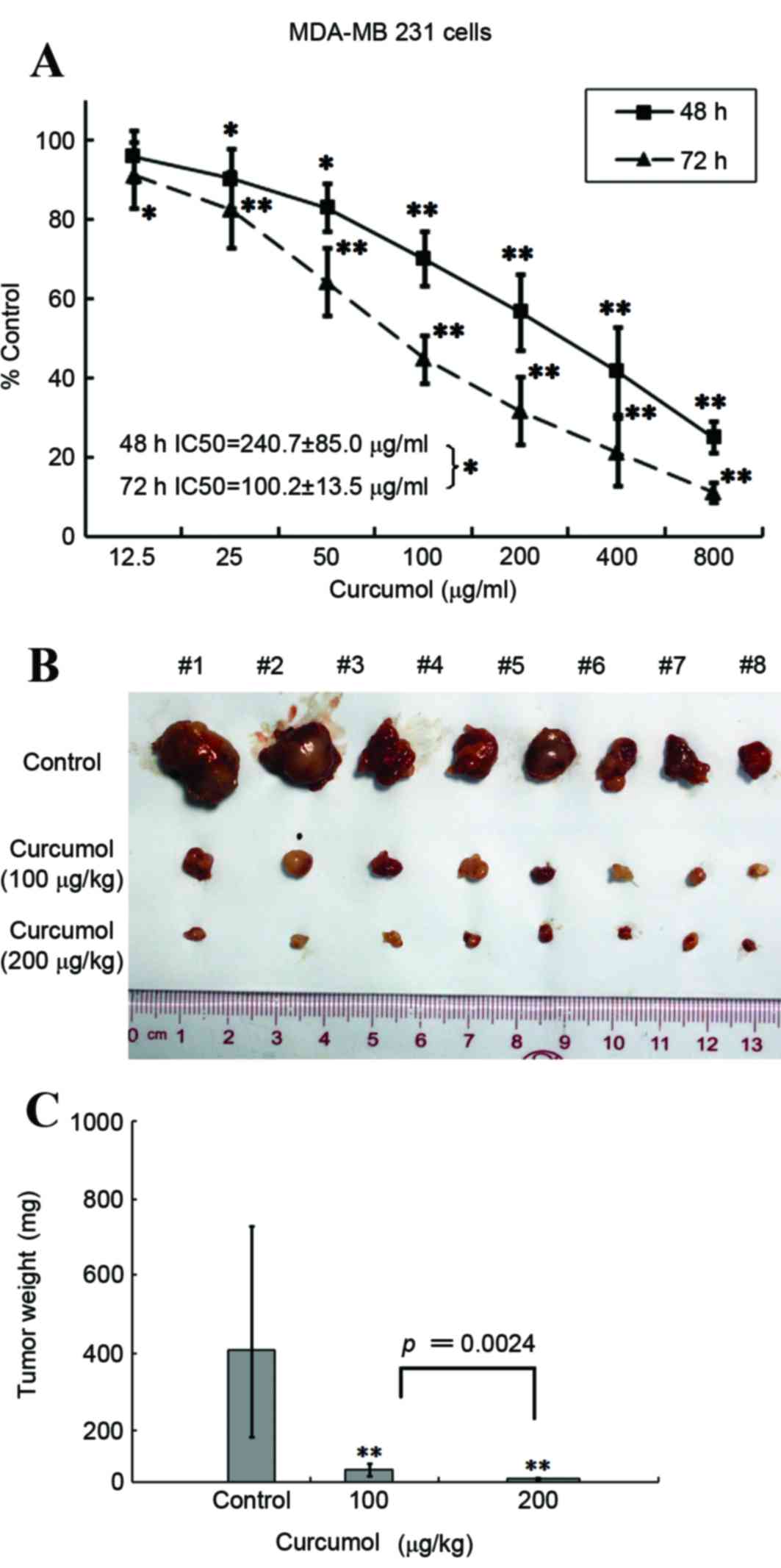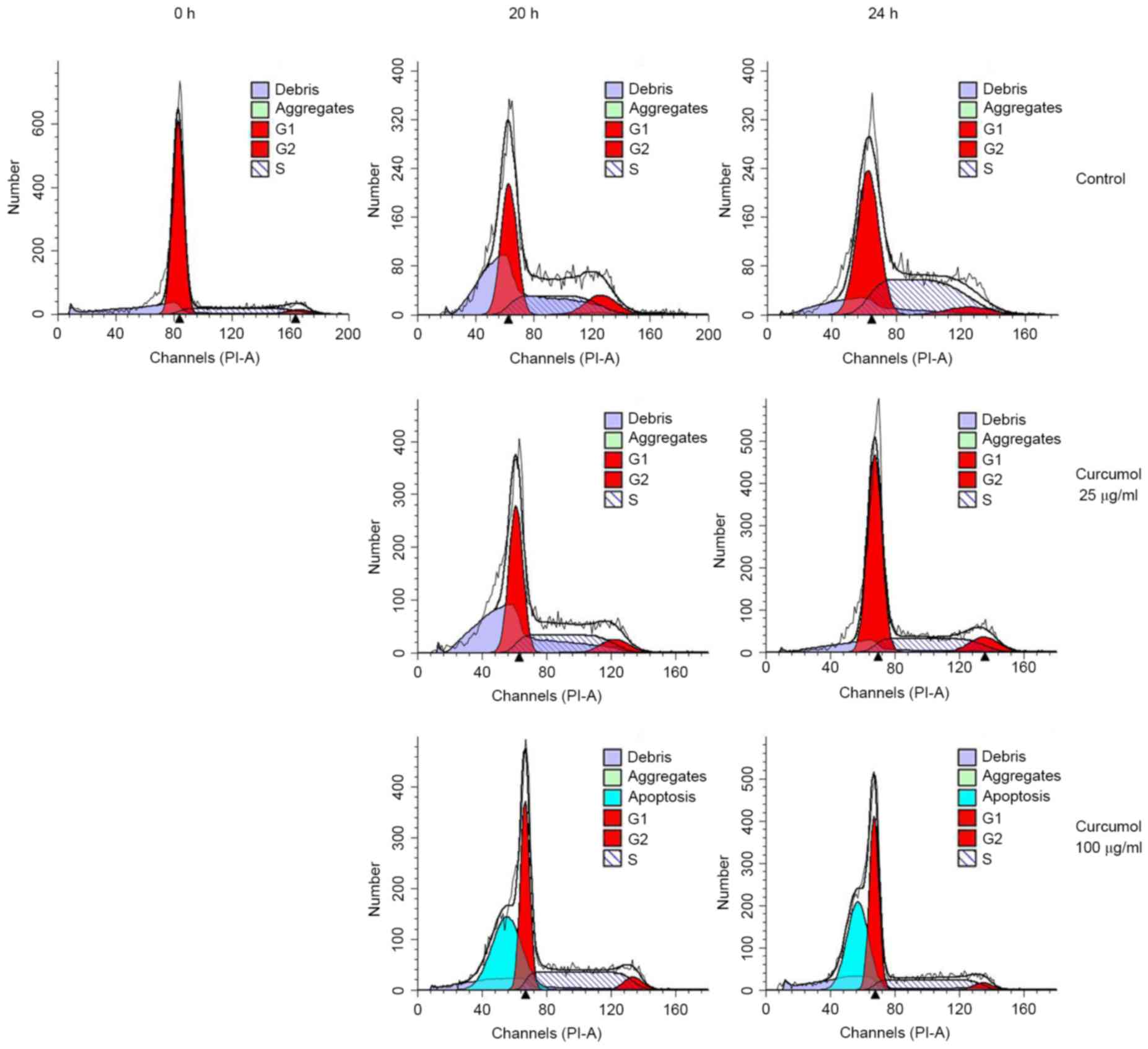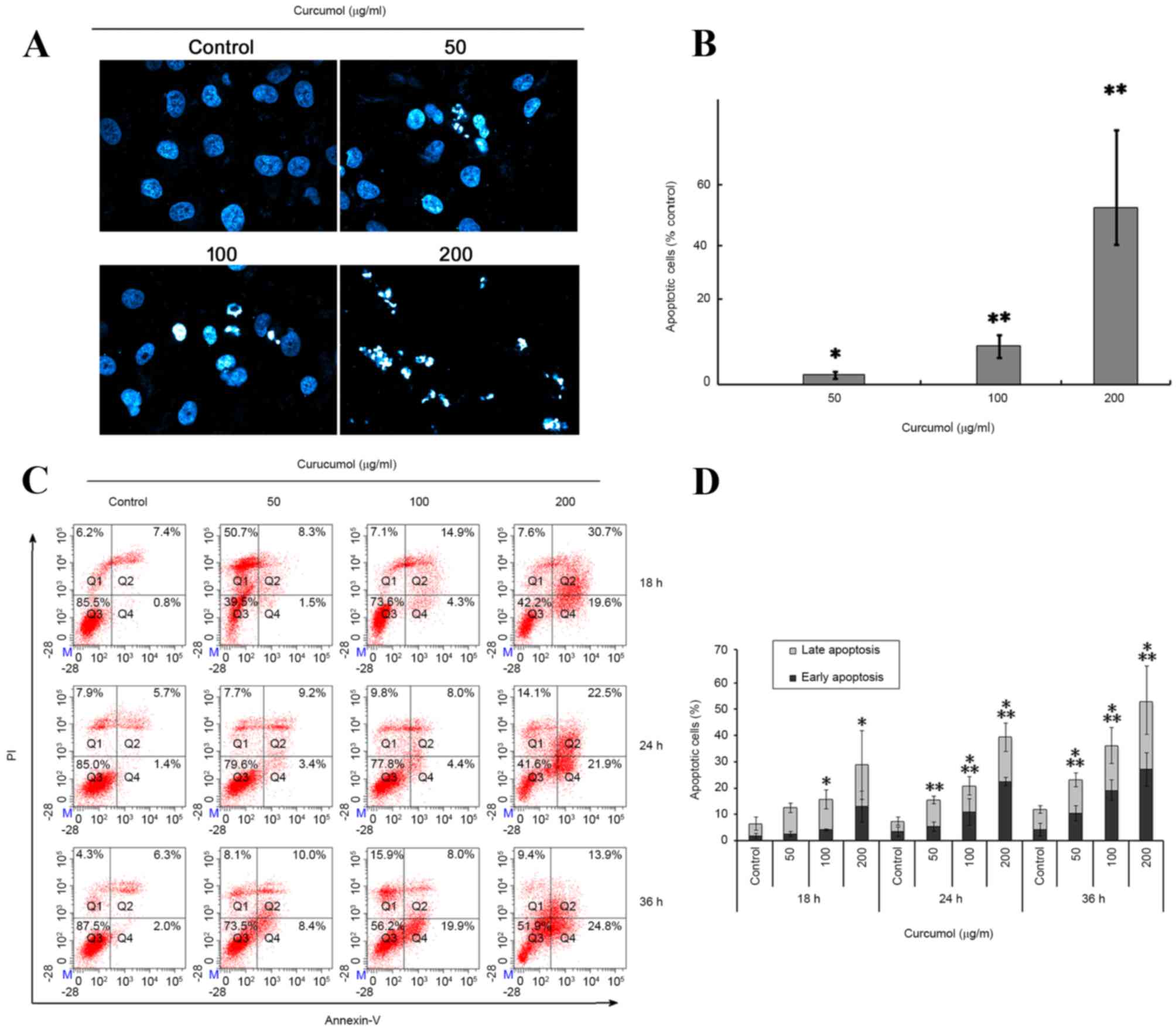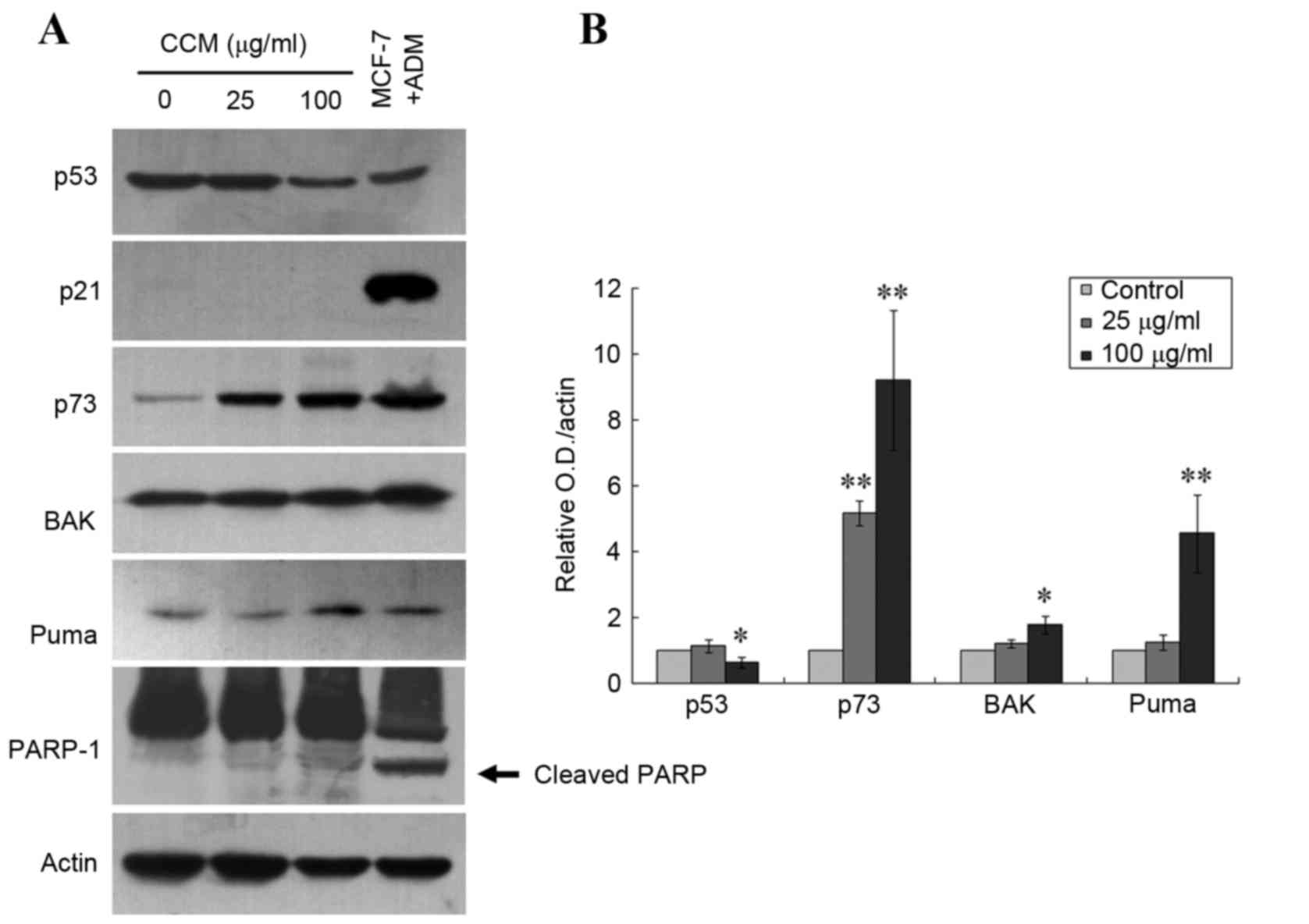|
1
|
Turner NC and Reis-Filho JS: Tackling the
diversity of triple-negative breast Cancer. Clin Cancer Res.
19:6380–6388. 2013. View Article : Google Scholar : PubMed/NCBI
|
|
2
|
Oakman C, Viale G and Di Leo A: Management
of triple negative breast cancer. Breast. 19:312–321. 2010.
View Article : Google Scholar : PubMed/NCBI
|
|
3
|
Duffy MJ, Synnott NC, McGowan PM, Crown J,
O'Connor D and Gallagher WM: p53 as a target for the treatment of
cancer. Cancer Treat Rev. 40:1153–1160. 2014. View Article : Google Scholar : PubMed/NCBI
|
|
4
|
Wang Z and Sun Y: Targeting p53 for novel
anticancer therapy. Transl Oncol. 3:1–12. 2010. View Article : Google Scholar : PubMed/NCBI
|
|
5
|
Lai D, Visser-Grieve S and Yang X: Tumour
suppressor genes in chemotherapeutic drug response. Biosci Rep.
32:361–374. 2012. View Article : Google Scholar : PubMed/NCBI
|
|
6
|
Jost CA, Marin MC and Kaelin WG Jr: p73 is
a simian [correction of human] p53-related protein that can induce
apoptosis. Nature. 389:191–194. 1997. View
Article : Google Scholar : PubMed/NCBI
|
|
7
|
Tiwary R, Yu W, Sanders BG and Kline K:
α-TEA cooperates with chemotherapeutic agents to induce apoptosis
of p53 mutant, triple-negative human breast cancer cells via
activating p73. Breast Cancer Res. 13:R12011. View Article : Google Scholar : PubMed/NCBI
|
|
8
|
Yoon MK, Ha JH, Lee MS and Chi SW:
Structure and apoptotic function of p73. BMB Rep. 48:81–90. 2015.
View Article : Google Scholar : PubMed/NCBI
|
|
9
|
Membership of the 5th Pharmacopoeia
Commission, . Pharmacopoeia of the People's Republic of China
(English edition). Pharmacopeia Commission of PRC, . Chemical
Industry Press; Beijing: pp. 2302000
|
|
10
|
Liju VB, Jeena K and Kuttan R: An
evaluation of antioxidant, anti-inflammatory, and antinociceptive
activities of essential oil from Curcuma longa. L. Indian J
Pharmacol. 43:526–531. 2011. View Article : Google Scholar : PubMed/NCBI
|
|
11
|
State Pharmacopoeia Commission of P. R.
China, . Pharmacopoeia Commission of People's Republic of China.
China Medicinal Science and Technology Press; Beijing: pp. 2792005,
(In Chinese).
|
|
12
|
Dang YY, Li XC, Zhang QW, Li SP and Wang
YT: Preparative isolation and purification of six volatile
compounds from essential oil of Curcuma wenyujin using
high-performance centrifugal partition chromatography. J Sep Sci.
33:1658–1664. 2010. View Article : Google Scholar : PubMed/NCBI
|
|
13
|
Hikino H, Meguro K, Sakurai Y and Takemoto
T: Structure of curcumol. Chem Pharm Bull (Tokyo). 14:1241–1249.
1966. View Article : Google Scholar : PubMed/NCBI
|
|
14
|
Lu JJ, Dang YY, Huang M, Xu WS, Chen XP
and Wang YT: Anti-cancer properties of terpenoids isolated from
Rhizoma Curcumae-a review. J Ethnopharmacol. 143:406–411. 2012.
View Article : Google Scholar : PubMed/NCBI
|
|
15
|
Guo P, Wang YW, Weng BX, Li XK, Yang SL
and Ye FQ: Synthesis, anti-tumor activity, and structure-activity
relationships of curcumol derivatives. J Asian Nat Prod Res.
16:53–58. 2014. View Article : Google Scholar : PubMed/NCBI
|
|
16
|
Tang QL, Guo JQ, Wang QY, Lin HS, Yang ZP,
Peng T, Pan XD, Liu B, Wang SJ and Zang LQ: Curcumol induces
apoptosis in SPC-A-1 human lung adenocarcinoma cells and displays
anti-neoplastic effects in tumor bearing mice. Asian Pac J Cancer
Prev. 16:2307–2312. 2015. View Article : Google Scholar : PubMed/NCBI
|
|
17
|
Zhang W, Wang Z and Chen T: Curcumol
induces apoptosis via caspases-independent mitochondrial pathway in
human lung adenocarcinoma ASTC-a-1 cells. Med Oncol. 28:307–314.
2011. View Article : Google Scholar : PubMed/NCBI
|
|
18
|
Jiang X, Benovic JL and Wedegaertner PB:
Plasma membrane and nuclear localization of G protein coupled
receptor kinase 6A. Mol Biol Cell. 18:2960–2969. 2007. View Article : Google Scholar : PubMed/NCBI
|
|
19
|
Yuan R, Meng Q, Hu H, Goldberg ID, Rosen
EM and Fan S: P53-independentdownregulation of p73 in human cancer
cells treated with Adriamycin. Cancer Chemother Pharmacol.
47:161–169. 2001. View Article : Google Scholar : PubMed/NCBI
|
|
20
|
Rana S, Gupta K, Gomez J, Matsuyama S,
Chakrabarti A, Agarwal ML, Agarwal A, Agarwal MK and Wald DN:
Securinine induces p73-dependent apoptosis preferentially in
p53-deficient colon cancer cells. FASEB J. 24:2126–2134. 2010.
View Article : Google Scholar : PubMed/NCBI
|
|
21
|
Hong B, Prabhu VV, Zhang S, van den Heuvel
AP, Dicker DT, Kopelovich L and El-Deiry WS: Prodigiosin rescues
deficient p53 signaling and antitumor effects via upregulating p73
and disrupting its interaction with mutant p53. Cancer Res.
74:1153–1165. 2014. View Article : Google Scholar : PubMed/NCBI
|
|
22
|
Elmore LW, Rehder CW, Di X, McChesney PA,
Jackson-Cook CK, Gewirtz DA and Holt SE: Adriamycin-induced
senescence in breast tumor cells involves functional p53 and
telomere dysfunction. J Biol Chem. 277:35509–35515. 2002.
View Article : Google Scholar : PubMed/NCBI
|
|
23
|
Khan SI, Zhao J, Khan IA, Walker LA and
Dasmahapatra AK: Potential utility of natural products as
regulators of breast cancer-associated aromatase promoters. Reprod
Biol Endocrinol. 9:912011. View Article : Google Scholar : PubMed/NCBI
|
|
24
|
Greenlee H: Natural products for cancer
prevention. Semin Oncol Nurs. 28:29–44. 2012. View Article : Google Scholar : PubMed/NCBI
|
|
25
|
You L, An R, Liang K and Wang X:
Anti-breast cancer agents from Chinese herbal medicines. Mini Rev
Med Chem. 13:101–105. 2013. View Article : Google Scholar : PubMed/NCBI
|
|
26
|
Meyn RE, Milas L and Stephens LC:
Apoptosis in tumor biology and therapy. Adv Exp Med Biol.
400B:657–667. 1997.PubMed/NCBI
|
|
27
|
Hassan M, Watari H, AbuAlmaaty A, Ohba Y
and Sakuragi N: Apoptosis and molecular targeting therapy in
cancer. Biomed Res Int. 2014:1508452014. View Article : Google Scholar : PubMed/NCBI
|
|
28
|
Xiao Y, Yang FQ, Li SP, Hu G, Lee SM and
Wang YT: Essential oil of Curcuma wenyujin induces apoptosis in
human hepatoma cells. World J Gastroenterol. 14:4309–4318. 2008.
View Article : Google Scholar : PubMed/NCBI
|
|
29
|
Lim CB, Ky N, Ng HM, Hamza MS and Zhao Y:
Curcuma wenyujin extract induces apoptosis and inhibits
proliferation of human cervical cancer cells in vitro and in vivo.
Integr Cancer Ther. 9:36–49. 2010. View Article : Google Scholar : PubMed/NCBI
|
|
30
|
Li Y, Shi X, Zhang J, Zhang X and Martin
RC: Hepatic protection and anticancer activity of curcuma: A
potential chemopreventive strategy against hepatocellular
carcinoma. Int J Oncol. 44:505–513. 2014.PubMed/NCBI
|
|
31
|
Chowdhury I, Tharakan B and Bhat GK:
Current concepts in apoptosis: The physiological suicide program
revisited. Cell Mol Biol Lett. 11:506–525. 2006. View Article : Google Scholar : PubMed/NCBI
|
|
32
|
Strasser A, Jost PJ and Nagata S: The many
roles of FAS receptor signaling in the immune system. Immunity.
30:180–192. 2009. View Article : Google Scholar : PubMed/NCBI
|
|
33
|
Riedl SJ and Salvesen GS: The apoptosome:
Signalling platform of cell death. Nat Rev Mol Cell Biol.
8:405–413. 2007. View Article : Google Scholar : PubMed/NCBI
|
|
34
|
Elkholi R, Floros KV and Chipuk JE: The
role of BH3-only proteins in tumor cell development, signaling, and
treatment. Genes Cancer. 2:523–537. 2011. View Article : Google Scholar : PubMed/NCBI
|
|
35
|
Ow YP, Green DR, Hao Z and Mak TW:
Cytochrome c: Functions beyond respiration. Nat Rev Mol Cell Biol.
9:532–542. 2008. View Article : Google Scholar : PubMed/NCBI
|
|
36
|
Pradelli LA, Bénéteau M and Ricci JE:
Mitochondrial control of caspase-dependent and -independent cell
death. Cell Mol Life Sci. 67:1589–1597. 2010. View Article : Google Scholar : PubMed/NCBI
|
|
37
|
Estaquier J, Vallette F, Vayssiere JL and
Mignotte B: The mitochondrial pathways of apoptosis. Adv Exp Med
Biol. 942:157–183. 2012. View Article : Google Scholar : PubMed/NCBI
|
|
38
|
Ren SX, Shen J, Cheng AS, Lu L, Chan RL,
Li ZJ, Wang XJ, Wong CC, Zhang L, Ng SS, et al: Correction: FK-16
derived from the anticancer peptide LL-37 induces
caspase-independent apoptosis and autophagic cell death in colon
cancer cells. PLoS One. 10:e01317502015. View Article : Google Scholar : PubMed/NCBI
|
|
39
|
Chipuk JE and Green DR: Dissecting
p53-dependent apoptosis. Cell Death Differ. 13:994–1002. 2006.
View Article : Google Scholar : PubMed/NCBI
|
|
40
|
el-Deiry WS, Tokino T, Velculescu VE, Levy
DB, Parsons R, Trent JM, Lin D, Mercer WE, Kinzler KW and
Vogelstein B: WAF1, a potential mediator of p53 tumor suppression.
Cell. 75:817–825. 1993. View Article : Google Scholar : PubMed/NCBI
|
|
41
|
Zhang Z, Huang C, Li J and Shi X:
Vanadate-induced cell growth arrest is p53-dependent through
activation of p21 in C141 cells. J Inorg Biochem. 89:142–148. 2002.
View Article : Google Scholar : PubMed/NCBI
|
|
42
|
Melino G, Bernassola F, Ranalli M, Yee K,
Zong WX, Corazzari M, Knight RA, Green DR, Thompson C and Vousden
KH: p73 Induces apoptosis via PUMA transactivation and Bax
mitochondrial translocation. J Biol Chem. 279:8076–8083. 2004.
View Article : Google Scholar : PubMed/NCBI
|
|
43
|
Ramadan S, Terrinoni A, Catani MV, Sayan
AE, Knight RA, Mueller M, Krammer PH, Melino G and Candi E: p73
inducesapoptosis by different mechanisms. Biochem Biophys Res
Commun. 331:713–717. 2005. View Article : Google Scholar : PubMed/NCBI
|
|
44
|
Ming L, Sakaida T, Yue W, Jha A, Zhang L
and Yu J: Sp1 and p73 activate PUMA following serum starvation.
Carcinogenesis. 29:1878–1884. 2008. View Article : Google Scholar : PubMed/NCBI
|
|
45
|
Yu J, Wang Z, Kinzler KW, Vogelstein B and
Zhang L: PUMA mediates the apoptotic response to p53 in colorectal
cancer cells. Proc Natl Acad Sci USA. 100:pp. 1931–1936. 2003;
View Article : Google Scholar : PubMed/NCBI
|
|
46
|
van Oijen MG and Slootweg PJ:
Gain-of-function mutations in the tumor suppressor gene p53. Clin
Cancer Res. 6:2138–2145. 2000.PubMed/NCBI
|


















